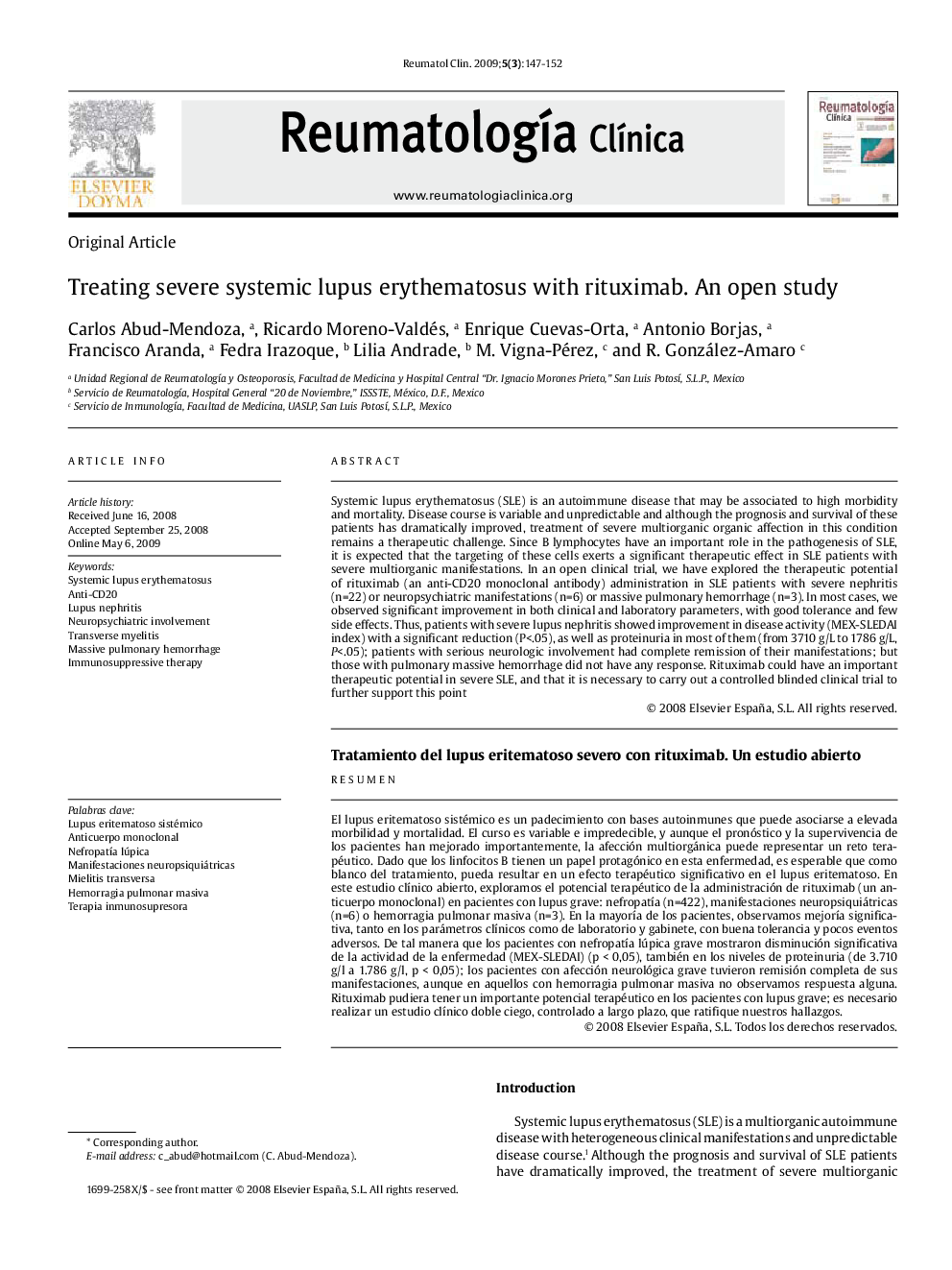| Article ID | Journal | Published Year | Pages | File Type |
|---|---|---|---|---|
| 3384642 | Reumatología Clínica (English Edition) | 2009 | 6 Pages |
Systemic lupus erythematosus (SLE) is an autoimmune disease that may be associated to high morbidity and mortality. Disease course is variable and unpredictable and although the prognosis and survival of these patients has dramatically improved, treatment of severe multiorganic organic affection in this condition remains a therapeutic challenge. Since B lymphocytes have an important role in the pathogenesis of SLE, it is expected that the targeting of these cells exerts a significant therapeutic effect in SLE patients with severe multiorganic manifestations. In an open clinical trial, we have explored the therapeutic potential of rituximab (an anti-CD20 monoclonal antibody) administration in SLE patients with severe nephritis (n = 22) or neuropsychiatric manifestations (n = 6) or massive pulmonary hemorrhage (n = 3). In most cases, we observed significant improvement in both clinical and laboratory parameters, with good tolerance and few side effects. Thus, patients with severe lupus nephritis showed improvement in disease activity (MEX-SLEDAI index) with a significant reduction (P < .05), as well as proteinuria in most of them (from 3710 g/L to 1786 g/L, P < .05); patients with serious neurologic involvement had complete remission of their manifestations; but those with pulmonary massive hemorrhage did not have any response. Rituximab could have an important therapeutic potential in severe SLE, and that it is necessary to carry out a controlled blinded clinical trial to further support this point
ResumenEl lupus eritematoso sistémico es un padecimiento con bases autoinmunes que puede asociarse a elevada morbilidad y mortalidad. El curso es variable e impredecible, y aunque el pronóstico y la supervivencia de los pacientes han mejorado importantemente, la afección multiorgánica puede representar un reto terapéutico. Dado que los linfocitos B tienen un papel protagónico en esta enfermedad, es esperable que como blanco del tratamiento, pueda resultar en un efecto terapéutico significativo en el lupus eritematoso. En este estudio clínico abierto, exploramos el potencial terapéutico de la administración de rituximab (un anticuerpo monoclonal) en pacientes con lupus grave: nefropatía (n = 422), manifestaciones neuropsiquiátricas (n = 6) o hemorragia pulmonar masiva (n = 3). En la mayoría de los pacientes, observamos mejoría significativa, tanto en los parámetros clínicos como de laboratorio y gabinete, con buena tolerancia y pocos eventos adversos. De tal manera que los pacientes con nefropatía lúpica grave mostraron disminución significativa de la actividad de la enfermedad (MEX-SLEDAI) (p < 0,05), también en los niveles de proteinuria (de 3.710 g/l a 1.786 g/l, p < 0,05); los pacientes con afección neurológica grave tuvieron remisión completa de sus manifestaciones, aunque en aquellos con hemorragia pulmonar masiva no observamos respuesta alguna. Rituximab pudiera tener un importante potencial terapéutico en los pacientes con lupus grave; es necesario realizar un estudio clínico doble ciego, controlado a largo plazo, que ratifique nuestros hallazgos.
